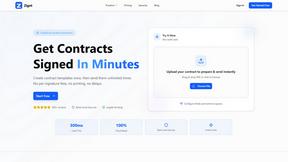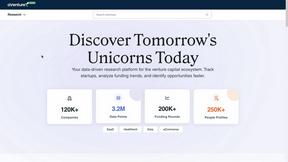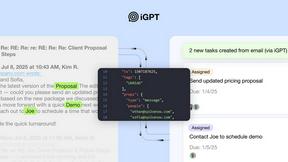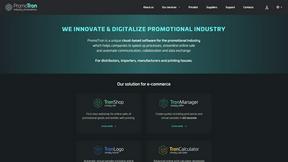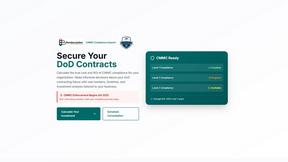Best Business Intelligence products (10+)
Discover 10+ best business intelligence products. Compare features, pricing, and reviews. Free and paid options available.
finban
finban simplifies liquidity planning, empowering confident decisions on hiring, taxes, and investments without Excel.
Zignt
Zignt simplifies contract management with secure templates, seamless sharing, and automated reminders for efficient c...
aVenture
aVenture is an AI-driven platform for comprehensive research on private companies, competitors, investors, and market...
iGPT
iGPT gives AI agents secure, contextual answers from your team's email and attachments.
Promotron
PromoTron is cloud-based software that streamlines promotional product sales and automates collaboration for businesses.
Threat Watch
Instantly assess your cyber security health and gain actionable insights to protect against threats and breaches.
Pursuit
Pursuit simplifies revenue generation in the public sector by identifying buying signals and connecting you with key ...
CMMC ROI
Calculate your CMMC compliance ROI to make informed DoD contracting decisions and secure your contracts today.
Deeploy
Deeploy empowers organizations to govern and monitor AI systems effectively, reducing risk while ensuring compliance ...
AutoPhish
AutoPhish automates phishing simulations and training to strengthen your team's defenses against evolving cyber threats.
FAQs for Business Intelligence
What advantages does the Business Intelligence Category offer for decision-making?
The Business Intelligence Category significantly enhances decision-making by providing data-driven insights through sophisticated analytics and visualization tools. These capabilities enable businesses to quickly identify trends, evaluate performance, and make informed choices that align with their strategic objectives, ensuring competitive advantage.
How does data integration work within the Business Intelligence Category?
Data integration within the Business Intelligence Category involves collating data from multiple sources into a unified system. This process allows organizations to analyze comprehensive datasets, yielding a holistic view of their operations. By enhancing the depth of analysis, businesses can uncover insights that drive effective strategies and outcomes.
How can the Business Intelligence Category improve operational efficiency?
The Business Intelligence Category improves operational efficiency by automating data collection and reporting processes. By streamlining these functions, organizations can minimize manual errors and reduce the time spent on analysis, allowing teams to focus on strategic initiatives that drive growth and optimize resource utilization.
What makes the Business Intelligence Category stand out from other analytics tools?
The Business Intelligence Category stands out due to its comprehensive approach to data analysis and visualization. It integrates various data sources seamlessly, offering unique features like predictive analytics and automated reporting, making it a vital tool for organizations seeking deeper insights and enhanced decision-making capabilities.
What key benefits does predictive analytics provide in the Business Intelligence Category?
Predictive analytics in the Business Intelligence Category offers crucial benefits such as forecasting future trends based on historical data. This empowers organizations to make proactive decisions, foresee market shifts, and strategize accordingly, ultimately enhancing their competitive edge in the marketplace.
How do users typically interact with the tools in the Business Intelligence Category?
Users typically interact with tools in the Business Intelligence Category through intuitive dashboards and reporting interfaces. This user-friendly engagement allows them to visualize data, perform analyses, and generate insights efficiently, enabling timely decision-making that aligns with their business objectives and market trends.
You may also like
Photography
The Photography Category connects photographers with AI tools that optimize workflows and enhance creativity.
HR & Recruiting
The HR & Recruiting Category offers AI solutions to enhance hiring efficiency and improve talent acquisition.
Industrial Automation
Discover how the Industrial Automation Category boosts manufacturing efficiency and productivity.
Meeting & Scheduling
The Meeting & Scheduling Category offers efficient tools for optimizing appointments and increasing productivity.
Marketing
The Marketing Category simplifies digital campaigns, offering essential tools for marketers.
Interior Design
The Interior Design Category connects designers with innovative tools, enhancing creativity.
SEO
The SEO Category helps users find essential AI tools for effective search engine optimization.
Real Estate
The Real Estate Category connects users with tailored AI solutions for efficient property management.


